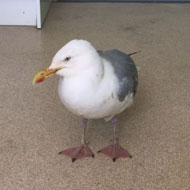
Vets urged to give birds time to recover from alcohol effects
The RSPCA has had more than a dozen reports of ‘drunk’ gulls on the south west coast, prompting concerns that they could be accessing waste products from local breweries.
Local vets are being urged not to euthanise birds that come in displaying similar symptoms, but to give them a chance to recover from the effects of the alcohol.
RSPCA vet David Couper, who has treated a number of the birds, said: “The birds appear disorientated and confused and struggle to stand. We took some video of one of the birds who is staggering around and losing his balance just like a person would if they’d had too much to drink.”
A few of the birds have died but most made a good recovery and were released within a few days.
Over the past few weeks, the charity has been called out to birds across Devon, including Dawlish, Seaton, Colyton, Exmouth, Exeter, Sidmouth, Starcross and Budleigh Salterton. A few also came through from Bridport and Lyme Regis in Dorset.
It is thought they may be gaining access to brewing waste products, but determining the source is difficult, as brewery waste can also be used as a compost and feed.
The RSPCA is urging local breweries, distilleries and alcohol producers to check that their waste is secure and cannot be accessed by wildlife.
Any concerns about the welfare of birds or other animals can be reported to the RSPCA’s 24-hour helpline on 0300 1234 999.
Image courtesy of the RSPCA



 The Veterinary Medicines Directorate (VMD) is inviting applications from veterinary students to attend a one-week extramural studies (EMS) placement in July 2026.
The Veterinary Medicines Directorate (VMD) is inviting applications from veterinary students to attend a one-week extramural studies (EMS) placement in July 2026.